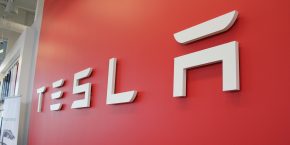

Goldman Sachs analyst Patrick Archambault and his team recently met with Tesla CEO Elon Musk, Autopilot Program Director Sterling Anderson and CFO Jason Wheeler to visit Tesla’s Fremont factory. Today the team released a report of their visit (via Valuewalk) and reiterated a “Neutral” rating on the company’s stock after the share price increased by ~12% this week.
Most notably, Archambault writes in his report that they see Tesla as now being about 80% vertically integrated, which is rare in the automotive industry where companies are focusing on the assembly process and engine manufacturing.
Goldman Sachs notes that Tesla has grown into the 5.5 million-square-foot Fremont plant, going as far as saying that it is now “fully utilizing it” and expects Tesla to move non-assembly functions to other facilities when expanding.
Tesla has now several other manufacturing and tooling facilities including a casting foundry in Lathrop near Fremont, a tool and die plant in Grand Rapids, Michigan, and a final assembly factory in Tilburg, Netherlands.
During their visit, the Goldman Sachs team also noted continued improvements in the Model X production ramp up (via Valuewalk):
“There are Model Xs coming down the assembly line “interspersed with Model S vehicles.” They added that the body shop that’s working on the SUV still isn’t running at full capacity as Tesla management said they’re doing what they call burst builds,” which involves assembling a group of the SUVs and then inspect them fully at various stages throughout assembly.”
On the battery front, Goldman Sachs says Tesla’s battery pack cost is at about $200 per kWh, which would bring the cost of the company’s smallest pack at $14,000 (70 kWh) and the bigger 90 kWh pack at $18,000.
Tesla’s Gigafactory in Nevada aims at reducing the cost by more than 30%, which should go a long way in helping eventually bring the cost down below $100/kWh – an important goal for the company.
The financial analysts also discussed the Autopilot program with CEO Elon Musk and new Program Director Sterling Anderson. Goldman came out of the meeting feeling that Musk has become skeptical that machine learning can solve the harder problems involved with autonomous driving, saying that to be viable the system would need to achieve 99.999% accuracy, while he currently sees machine learning reaching 80% or 90% accuracy. Though Musk recently hired several machine learning experts to try to solve those problems.
FTC: We use income earning auto affiliate links. More.




$200/kwh!! That’s the first time I’ve seen confirmation of a pack cost.
it’s not confirmation but Goldman Sachs’s educated guess 🙂
For the $200/kwh price, if the average EV Conversion Company could get Tesla to build them Modules at 7, 9, 14, & 18 kWh for $1,400, $1,800, $2,800, & $3,600, they could do wonders on the EV Conversion front!
I was looking at LiFePO4 (Lithium Iron Phosphate) Headway 15 Ah cells at about $25 US each. 160 of them would make a pack of about 7.5 kWh, but the price was about $4,000, so closer to about $533/kWh! Good 10C rating for power, not so much in range.